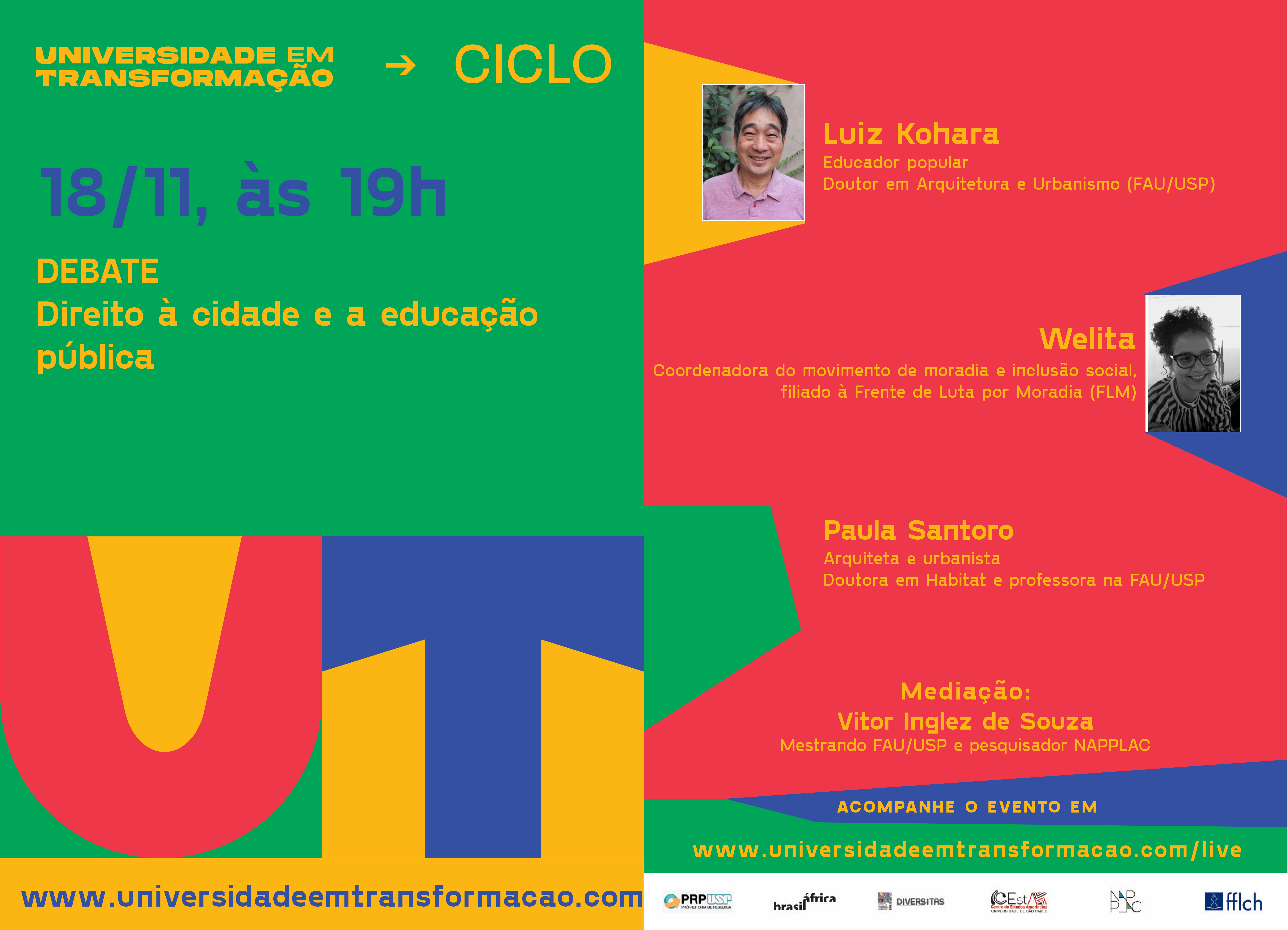The ideals of more equitable and fair cities have historically mobilized social movements and academia to defend the guarantee of social rights for all, without any form of gender, ethnic, sexual and religious discrimination. These ideals centralize the guidelines for the right to the city in the face of structural Brazilian socio-spatial inequality. The pandemic of the new corona virus “covid 19” has broadly exposed Brazilian socio-spatial inequalities and widened them among the most disadvantaged segments. The majority of those affected by the covid 19 are informal workers, unemployed, homeless, living in precarious areas, both in the peripheries and in the center, and above all women and blacks historically inferior in Brazilian society.
In addition to this particularly adverse context in which we find ourselves - with the intensification of the widespread privatization agenda, extinction of rights and the upsurge in state violence that naturally accompanies them -, it has been operating through increasingly complex mechanisms, concealing reality and generalization of misinformation and confusion especially directed at the people from whom resistance should come.
This table proposes to discuss, therefore, what are the paths (new or not) for the fundamental alliance between the knowledge produced by public education and the concrete struggle of people who have resisted this reversal, in the effective articulation between knowledge and practice in search for the right to the city. Centered on the urban, the debate will go through the importance and urgency of deepening the links between the production of critical knowledge effectively engaged with the transformation of territories and the repertoires and practices of the people and movements that have been fighting for them in this especially difficult context.
Luiz Kohara - Popular educator, executive secretary of the Gaspar Garcia Center for Human Rights. Master in civil engineering (Politécnica / USP), PhD in Architecture and Urbanism (FAU / USP), with post-doctorate in the areas of urban sociology (USP) and housing (UFABC).
Welita (FLM) - graduated from the school of the Inter-Union Department of Statistics and Socioeconomic Studies (DIEESE), in Labor Sciences, Coordinator of the movement of housing and social inclusion, affiliated with the Front of Struggle for Housing (FLM), coordinates 4 occupations in the center from São Paulo, accompanies 35 tenements, in which 480 families live.
Paula Santoro - Architect and urban planner, PhD in Habitat by FAU USP with a scholarship at the Polytechnic University of Cataluña and professor of Urban Planning at the Design Department at FAU USP. Currently coordinates the ObservaSP project and Observatory of Removals with LabCidade FAU USP
Mediation: Vitor Inglez de Souza - Lawyer at the Gaspar Garcia Center for Human Rights, master's student at FAU USP, researcher NAPPLAC - Research Support Center: Production and Language of the Built Environment
About the Cycle of Lectures and Debates "University in Transformation: challenges and potential - Education, research and human rights in the 21st century in an interdisciplinary perspective"
The Cycle discusses themes such as democratization of access and permanence at the university, anti-racist struggle, indigenous rights, technology and online education, digital exclusion, academy and social movements, decolonization of thought, feminisms, interdisciplinarity and knowledge of blacks, indigenous, quilombolas riverside dwellers, immigrants, refugees, Africans, Arabs, people with disabilities, trans people, non-binary and LGBTQIA +, gender perspective, urban, rural and peripheral cultures, so that they can be heard and so that their narratives, knowledge, themes, experiences and experiences of oppression and diverse violence (epistemic, physical, psychological), as well as resistance, autonomy and empowerment, are incorporated by the university and valued in academic and extra-academic spaces.
For about 2 months (from 10/15 to 12/18), more than 100 speakers will interact, in videoconferences broadcast on Youtube, with a wide group of people on social networks (Youtube, Instagram, Facebook and Twitter) and on the website do Ciclo (www.universidadeemtransformacao.com).
Organized by 4 USP Research Support Centers: NAP Brazil Africa, NAP Diversitas - Center for the Study of Diversities, Intolerances and Conflicts, Center for Amerindian Studies (CEstA) and Center for Support for Research in the Production and Language of the Built Environment (NAPPLAC) , with support from USP's Dean of Research, the Cycle was designed, from the design of the format to the diversity of the participating guests, with the objective of expanding exchanges, dialogues and the horizontal sharing of knowledge among the members of the NAPs and between them , different universities, national and foreign, and different sectors of civil society.
Among the questions that the cycle "University in transformation: challenges and potential - Education, Research and Human Rights in the 21st century in an interdisciplinary perspective" will discuss are: How to value the themes listed above? How to expand the democratization of access and permanence at the university and strengthen its transformation? How to promote the decolonization of thought and dialogue with other knowledge that is not necessarily academic? How to guarantee the decolonization of academic practices (in face-to-face formats and also in the context of virtualization / hybridization of teaching)? How to ensure interdisciplinarity and a diversified theoretical foundation / bibliography?
Confirm the schedule of upcoming events at http://universidadeemtransformacao.com/programacao/.
Come join us in this debate!


